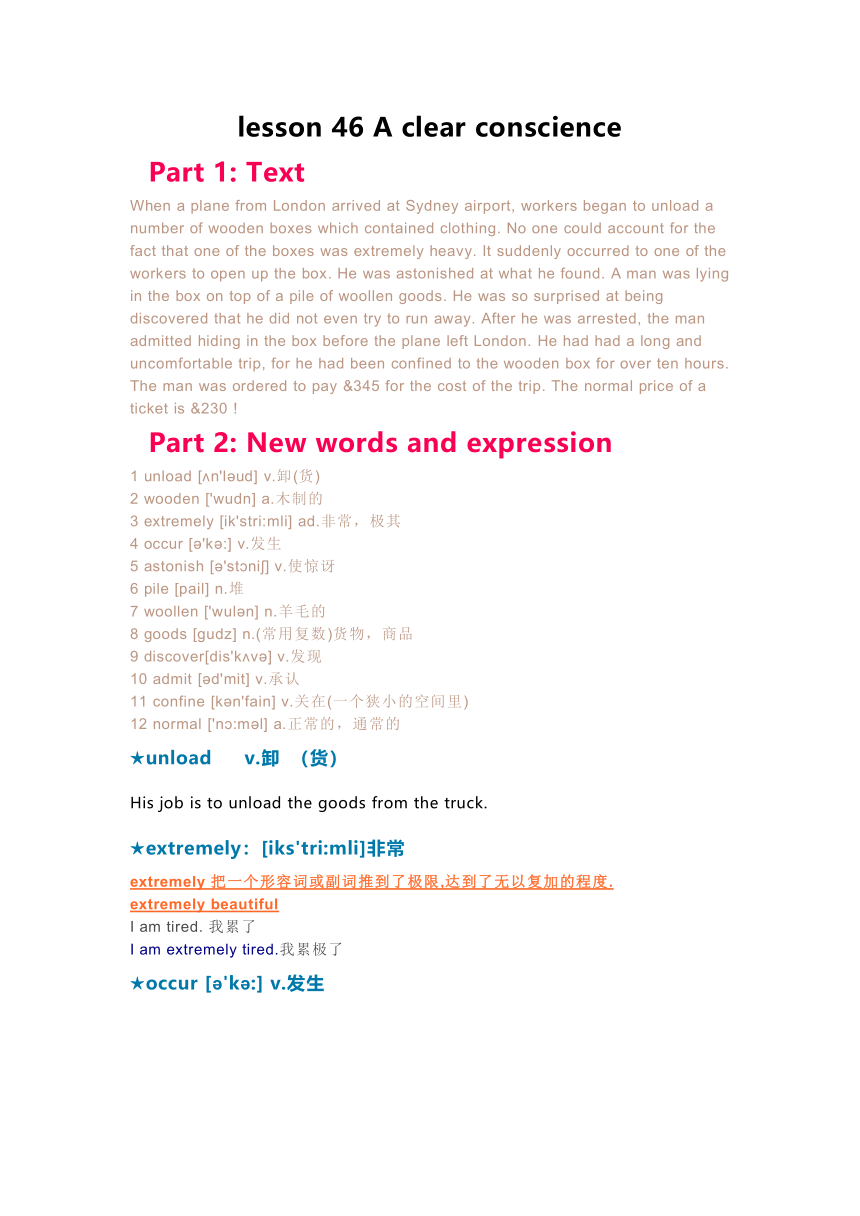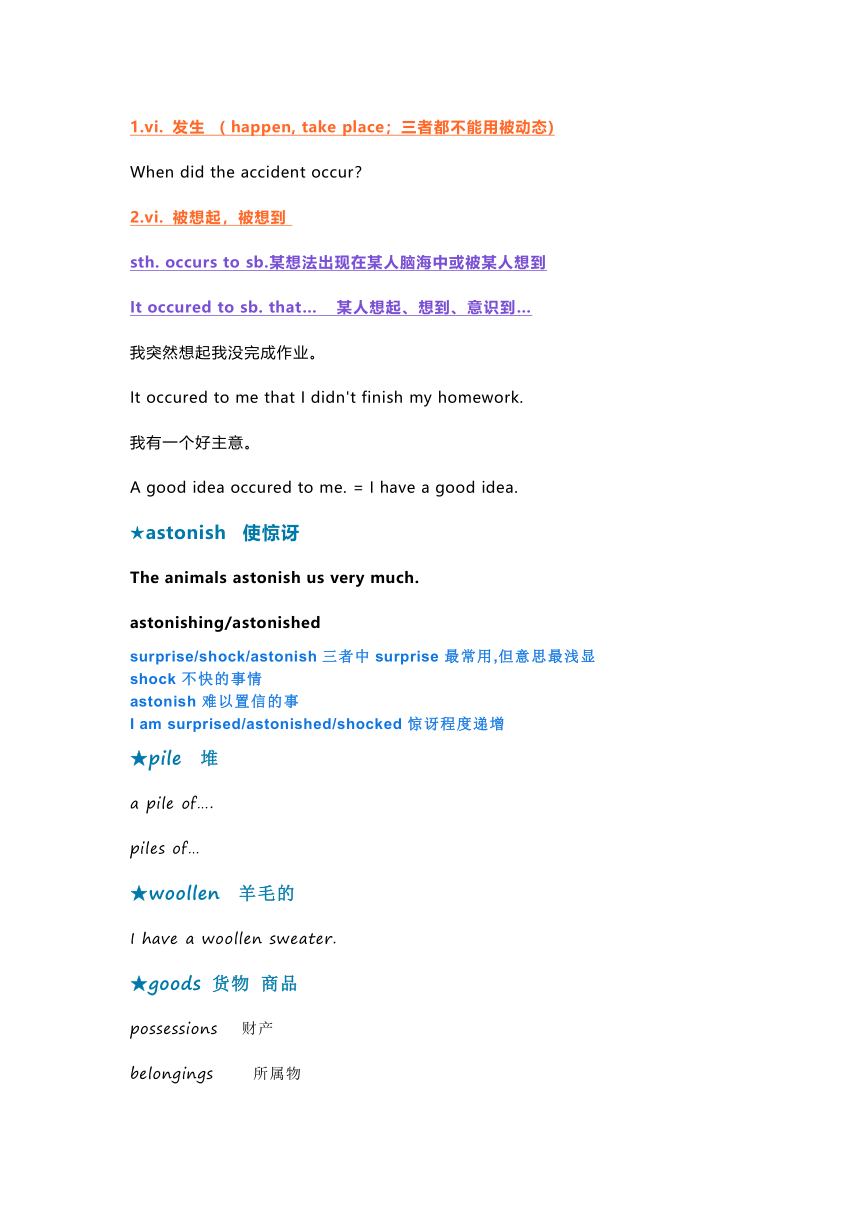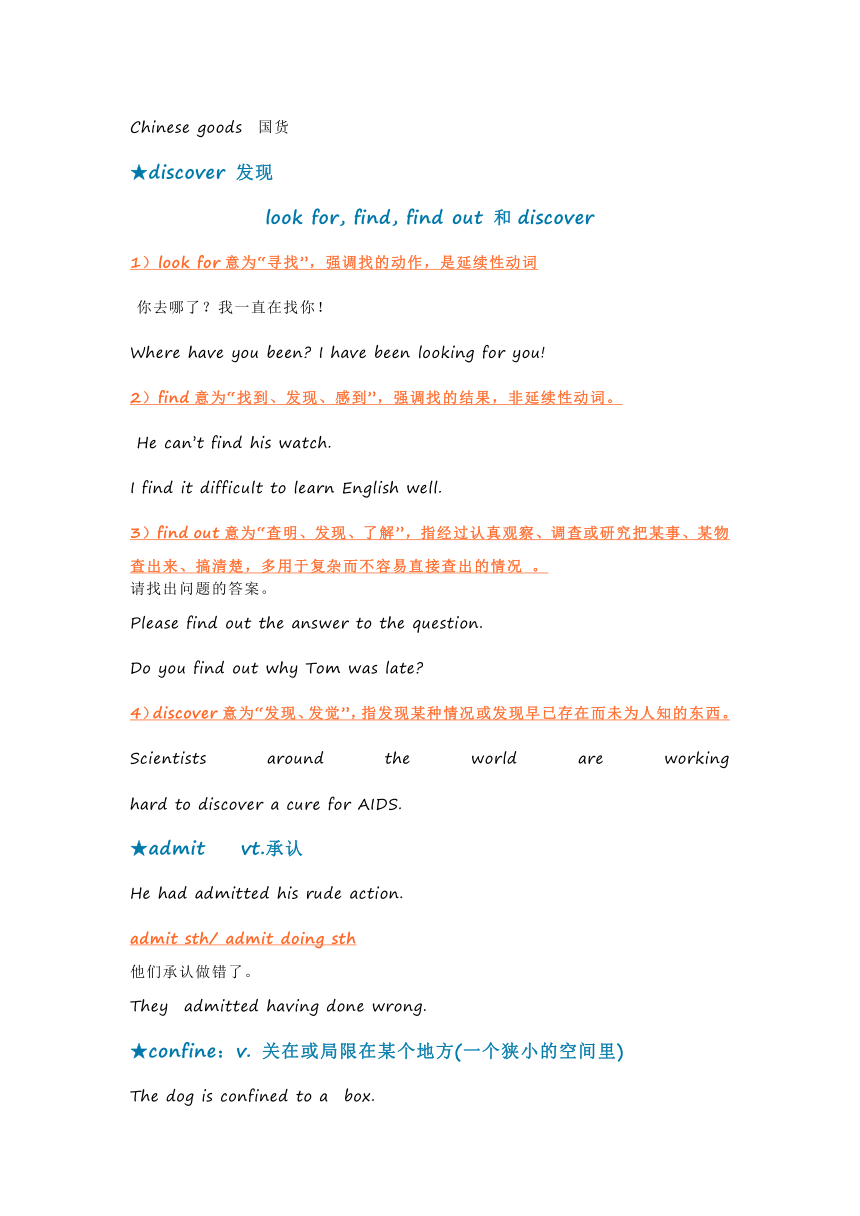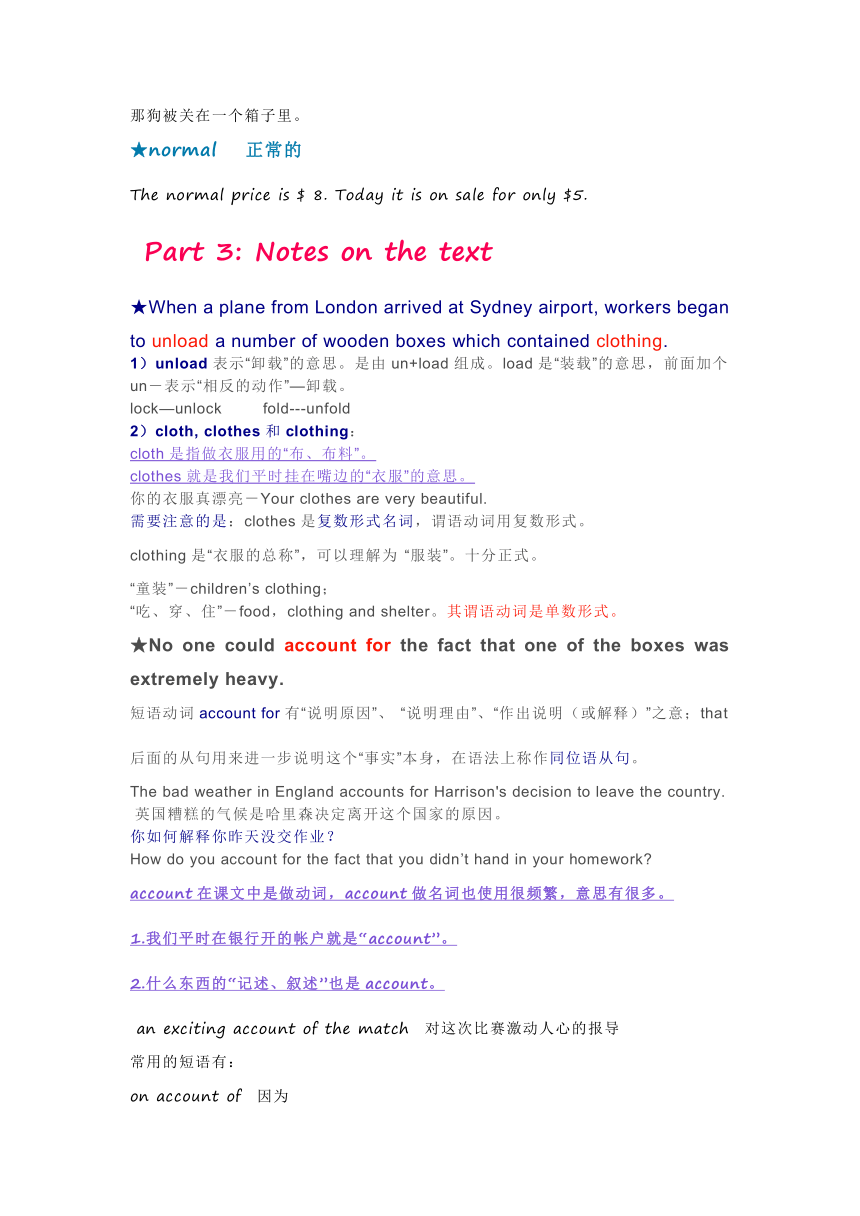新概念英语第二册 Lesson 46 A clear conscience 讲义
文档属性
| 名称 | 新概念英语第二册 Lesson 46 A clear conscience 讲义 |  | |
| 格式 | docx | ||
| 文件大小 | 27.5KB | ||
| 资源类型 | 教案 | ||
| 版本资源 | 新概念英语 | ||
| 科目 | 英语 | ||
| 更新时间 | 2023-09-24 22:23:23 | ||
图片预览




文档简介
lesson 46 A clear conscience
Part 1: Text
When a plane from London arrived at Sydney airport, workers began to unload a number of wooden boxes which contained clothing. No one could account for the fact that one of the boxes was extremely heavy. It suddenly occurred to one of the workers to open up the box. He was astonished at what he found. A man was lying in the box on top of a pile of woollen goods. He was so surprised at being discovered that he did not even try to run away. After he was arrested, the man admitted hiding in the box before the plane left London. He had had a long and uncomfortable trip, for he had been confined to the wooden box for over ten hours. The man was ordered to pay &345 for the cost of the trip. The normal price of a ticket is &230 !
Part 2: New words and expression
1 unload [ n'l ud] v.卸(货)
2 wooden ['wudn] a.木制的
3 extremely [ik'stri:mli] ad.非常,极其
4 occur [ 'k :] v.发生
5 astonish [ 'st ni ] v.使惊讶
6 pile [pail] n.堆
7 woollen ['wul n] n.羊毛的
8 goods [gudz] n.(常用复数)货物,商品
9 discover[dis'k v ] v.发现
10 admit [ d'mit] v.承认
11 confine [k n'fain] v.关在(一个狭小的空间里)
12 normal ['n :m l] a.正常的,通常的
★unload v.卸 (货)
His job is to unload the goods from the truck.
★extremely:[iks'tri:mli]非常
extremely 把一个形容词或副词推到了极限,达到了无以复加的程度.
extremely beautiful
I am tired. 我累了
I am extremely tired.我累极了
★occur [ 'k :] v.发生
1.vi. 发生 ( happen, take place;三者都不能用被动态)
When did the accident occur?
2.vi. 被想起,被想到
sth. occurs to sb.某想法出现在某人脑海中或被某人想到
It occured to sb. that… 某人想起、想到、意识到…
我突然想起我没完成作业。
It occured to me that I didn't finish my homework.
我有一个好主意。
A good idea occured to me. = I have a good idea.
★astonish 使惊讶
The animals astonish us very much.
astonishing/astonished
surprise/shock/astonish三者中surprise 最常用,但意思最浅显
shock 不快的事情
astonish 难以置信的事
I am surprised/astonished/shocked 惊讶程度递增
★pile 堆
a pile of….
piles of…
★woollen 羊毛的
I have a woollen sweater.
★goods 货物 商品
possessions 财产
belongings 所属物
Chinese goods 国货
★discover 发现
look for, find, find out 和discover
1)look for意为“寻找”,强调找的动作,是延续性动词
你去哪了?我一直在找你!
Where have you been I have been looking for you!
2)find意为“找到、发现、感到”,强调找的结果,非延续性动词。
He can’t find his watch.
I find it difficult to learn English well.
3)find out意为“查明、发现、了解”,指经过认真观察、调查或研究把某事、某物查出来、搞清楚,多用于复杂而不容易直接查出的情况 。
请找出问题的答案。
Please find out the answer to the question.
Do you find out why Tom was late
4)discover意为“发现、发觉”,指发现某种情况或发现早已存在而未为人知的东西。
Scientists around the world are working hard to discover a cure for AIDS.
★admit vt.承认
He had admitted his rude action.
admit sth/ admit doing sth
他们承认做错了。
They admitted having done wrong.
★confine:v. 关在或局限在某个地方(一个狭小的空间里)
The dog is confined to a box.
那狗被关在一个箱子里。
★normal 正常的
The normal price is $ 8. Today it is on sale for only $5.
Part 3: Notes on the text
★When a plane from London arrived at Sydney airport, workers began to unload a number of wooden boxes which contained clothing.
1)unload表示“卸载”的意思。是由un+load组成。load是“装载”的意思,前面加个un-表示“相反的动作”—卸载。
lock—unlock fold---unfold
2)cloth, clothes和clothing:
cloth是指做衣服用的“布、布料”。
clothes就是我们平时挂在嘴边的“衣服”的意思。
你的衣服真漂亮-Your clothes are very beautiful.
需要注意的是:clothes是复数形式名词,谓语动词用复数形式。
clothing是“衣服的总称”,可以理解为 “服装”。十分正式。
“童装”-children’s clothing;
“吃、穿、住”-food,clothing and shelter。其谓语动词是单数形式。
★No one could account for the fact that one of the boxes was extremely heavy.
短语动词account for有“说明原因”、 “说明理由”、“作出说明(或解释)”之意;that后面的从句用来进一步说明这个“事实”本身,在语法上称作同位语从句。
The bad weather in England accounts for Harrison's decision to leave the country.
英国糟糕的气候是哈里森决定离开这个国家的原因。
你如何解释你昨天没交作业?
How do you account for the fact that you didn’t hand in your homework
account在课文中是做动词,account做名词也使用很频繁,意思有很多。
1.我们平时在银行开的帐户就是“account”。
2.什么东西的“记述、叙述”也是account。
an exciting account of the match 对这次比赛激动人心的报导
常用的短语有:
on account of 因为
take sth. into account “把…考虑进去” 。
★It suddenly occurred to one of the workers to open up the box.
(1)表示某人想到某事时,要用 sth. occurred to sb. 这个结构,主语为事,而不是人。
(2)it在句中为先行主语,代替不定式to open up the box。
It occurred to sb to do sth
(3)open up的含义之一是“打开”:
open up boxes/gifts 打开箱子/礼物
他收到礼物后立刻就打开了。
When he received the gifts, he opened them up at once.
★He was astonished at what he found. A man was lying in the box on top of a pile of woollen goods.
1.在这句话中 what引导的名词性从句作介词 at的宾语,其中what相当于the thing which。
表示某事使/让某人吃惊通常用
sb. is/are/was/were… astonished at sth.
这消息/声音似乎使Sam吃了一惊。
Sam was astonished at the news/the sound.
2.复习lie和lay的区别:
①lie作“躺,卧、处于(位置)”解 时,过去式为:lay,过去分词为:lain;
②lie作“撒谎”解时,过去式为:lied,过去分词为:lied;
③lay可作“放,摆,搁;产卵”解,其过去式和过去分词均为:laid。
3.on top of, 在……上层
She put the bread on top of a pile of other goods.
她把面包放在一堆其他货物上面。
而我们平时所要表达的“在…顶部、在…头部”,我们使用at the top of短语。
Write your name at the top of the page.
此外,短语on top of the world意思是extremely happy
★He was so surprised at being discovered that he did not even try to run away.
这句话的主要句型仍为 so… that…。动名词短语being discovered是介词at的宾语,由于是被动语态,因此要用动词 be加上-ing的形式。
★After he was arrested, the man admitted hiding in the box before the plane left London.
admit doing sth.表示“承认做某事”。
He admitted stealing the money.
此外,这个句子的翻译中,请大家注意一下after和before的用法。
★He had had a long and uncomfortable trip, for he had been confined to the wooden box for over eighteen hours.
confine表示“把……限制起来”,通常与介词to连用:
Last weekend, Tom's mother confined him to his room.
上个周末,汤姆的妈妈把他关在了房间里。
Part 4: Grammar&Difficult points
定语从句VS状语从句
1.定语从句和同位语从句都置于被修饰的名词或代词之后,形式上非常相似,尤其是由that引导时,最难区分。实际上,两者的根本区别在于句法功能不同,与先行词的关系不同
2.定语从句的引导词that在从句中一定充当句子成分;而同位语从句中的引导词that(被称为连接代词)在从句中只起连接作用,不充当任何句子成分。 定语从句的引导词在从句中作宾语或状语时,可以省略或被其他词代替;而同位语从句的引导词则一般不能省略,也不能被代替
例1. The news(that / which)we picked up from his informal conversation is true.我们从他的闲谈中听到的那个消息是真实的。
例2. The news that Mr Li will teach us English next semester is true. 李先生下学期将教我们英语这个消息是真实的。
例1的中that从句是定语从句,其作用相当于一个形容词,用来限定the news,that在从句中作宾语,可省略。
例2中的that从句是同位语从句,其作用相当于一个名词,本身就是the news的内容,that不能省略
3.定语从句所修饰、限定的先行词可以是名词或代词,当that省略时,定语从句本身是一个不完整的句子。而同位语从句通常与一些本身有具体内容可展开的名词连用,对这些名词进行补充说明或解释。常见的此类名词有:answer, belief, doubt, decision, explanation, fact, hope,idea, information, message, news, order, possibility,problem, promise, question, reason, story, suggestion,
例1.The fact (that / which) she told me yesterday is very important.
例2.The fact that she hasn’t known the result of the examination is clear.
例1中that / which引导的是定语从句,修饰fact,用以限定说明是哪个fact,that / which作told的宾语,可省略。例2中that引导的是同位语从句,用以说明fact的内容,that不充当句子成分,不可省略
【甄别的方法】
同位语从句与其所修饰的名词之间存在逻辑上的系表关系(即系动词与表语的关系),因此,可用“主+系+表”的结构来区别同位语从句和定语从句。 比如:将例2的从句与其修饰的名词用“主+系+表”结构来表示,则为:The news is that Mr Li will teach us English next semester,句意通顺,系表结构成立,故可判定其为同位语从句。若将例1的从句与其修饰的名词用“主+系+表”结构表示,句意不通顺,句子不成立,可判定其不是同位语从句。
Part 5: Homework
1.背诵lesson 46单词&课文
2.Retell the text
3.练习总结课文
Part 1: Text
When a plane from London arrived at Sydney airport, workers began to unload a number of wooden boxes which contained clothing. No one could account for the fact that one of the boxes was extremely heavy. It suddenly occurred to one of the workers to open up the box. He was astonished at what he found. A man was lying in the box on top of a pile of woollen goods. He was so surprised at being discovered that he did not even try to run away. After he was arrested, the man admitted hiding in the box before the plane left London. He had had a long and uncomfortable trip, for he had been confined to the wooden box for over ten hours. The man was ordered to pay &345 for the cost of the trip. The normal price of a ticket is &230 !
Part 2: New words and expression
1 unload [ n'l ud] v.卸(货)
2 wooden ['wudn] a.木制的
3 extremely [ik'stri:mli] ad.非常,极其
4 occur [ 'k :] v.发生
5 astonish [ 'st ni ] v.使惊讶
6 pile [pail] n.堆
7 woollen ['wul n] n.羊毛的
8 goods [gudz] n.(常用复数)货物,商品
9 discover[dis'k v ] v.发现
10 admit [ d'mit] v.承认
11 confine [k n'fain] v.关在(一个狭小的空间里)
12 normal ['n :m l] a.正常的,通常的
★unload v.卸 (货)
His job is to unload the goods from the truck.
★extremely:[iks'tri:mli]非常
extremely 把一个形容词或副词推到了极限,达到了无以复加的程度.
extremely beautiful
I am tired. 我累了
I am extremely tired.我累极了
★occur [ 'k :] v.发生
1.vi. 发生 ( happen, take place;三者都不能用被动态)
When did the accident occur?
2.vi. 被想起,被想到
sth. occurs to sb.某想法出现在某人脑海中或被某人想到
It occured to sb. that… 某人想起、想到、意识到…
我突然想起我没完成作业。
It occured to me that I didn't finish my homework.
我有一个好主意。
A good idea occured to me. = I have a good idea.
★astonish 使惊讶
The animals astonish us very much.
astonishing/astonished
surprise/shock/astonish三者中surprise 最常用,但意思最浅显
shock 不快的事情
astonish 难以置信的事
I am surprised/astonished/shocked 惊讶程度递增
★pile 堆
a pile of….
piles of…
★woollen 羊毛的
I have a woollen sweater.
★goods 货物 商品
possessions 财产
belongings 所属物
Chinese goods 国货
★discover 发现
look for, find, find out 和discover
1)look for意为“寻找”,强调找的动作,是延续性动词
你去哪了?我一直在找你!
Where have you been I have been looking for you!
2)find意为“找到、发现、感到”,强调找的结果,非延续性动词。
He can’t find his watch.
I find it difficult to learn English well.
3)find out意为“查明、发现、了解”,指经过认真观察、调查或研究把某事、某物查出来、搞清楚,多用于复杂而不容易直接查出的情况 。
请找出问题的答案。
Please find out the answer to the question.
Do you find out why Tom was late
4)discover意为“发现、发觉”,指发现某种情况或发现早已存在而未为人知的东西。
Scientists around the world are working hard to discover a cure for AIDS.
★admit vt.承认
He had admitted his rude action.
admit sth/ admit doing sth
他们承认做错了。
They admitted having done wrong.
★confine:v. 关在或局限在某个地方(一个狭小的空间里)
The dog is confined to a box.
那狗被关在一个箱子里。
★normal 正常的
The normal price is $ 8. Today it is on sale for only $5.
Part 3: Notes on the text
★When a plane from London arrived at Sydney airport, workers began to unload a number of wooden boxes which contained clothing.
1)unload表示“卸载”的意思。是由un+load组成。load是“装载”的意思,前面加个un-表示“相反的动作”—卸载。
lock—unlock fold---unfold
2)cloth, clothes和clothing:
cloth是指做衣服用的“布、布料”。
clothes就是我们平时挂在嘴边的“衣服”的意思。
你的衣服真漂亮-Your clothes are very beautiful.
需要注意的是:clothes是复数形式名词,谓语动词用复数形式。
clothing是“衣服的总称”,可以理解为 “服装”。十分正式。
“童装”-children’s clothing;
“吃、穿、住”-food,clothing and shelter。其谓语动词是单数形式。
★No one could account for the fact that one of the boxes was extremely heavy.
短语动词account for有“说明原因”、 “说明理由”、“作出说明(或解释)”之意;that后面的从句用来进一步说明这个“事实”本身,在语法上称作同位语从句。
The bad weather in England accounts for Harrison's decision to leave the country.
英国糟糕的气候是哈里森决定离开这个国家的原因。
你如何解释你昨天没交作业?
How do you account for the fact that you didn’t hand in your homework
account在课文中是做动词,account做名词也使用很频繁,意思有很多。
1.我们平时在银行开的帐户就是“account”。
2.什么东西的“记述、叙述”也是account。
an exciting account of the match 对这次比赛激动人心的报导
常用的短语有:
on account of 因为
take sth. into account “把…考虑进去” 。
★It suddenly occurred to one of the workers to open up the box.
(1)表示某人想到某事时,要用 sth. occurred to sb. 这个结构,主语为事,而不是人。
(2)it在句中为先行主语,代替不定式to open up the box。
It occurred to sb to do sth
(3)open up的含义之一是“打开”:
open up boxes/gifts 打开箱子/礼物
他收到礼物后立刻就打开了。
When he received the gifts, he opened them up at once.
★He was astonished at what he found. A man was lying in the box on top of a pile of woollen goods.
1.在这句话中 what引导的名词性从句作介词 at的宾语,其中what相当于the thing which。
表示某事使/让某人吃惊通常用
sb. is/are/was/were… astonished at sth.
这消息/声音似乎使Sam吃了一惊。
Sam was astonished at the news/the sound.
2.复习lie和lay的区别:
①lie作“躺,卧、处于(位置)”解 时,过去式为:lay,过去分词为:lain;
②lie作“撒谎”解时,过去式为:lied,过去分词为:lied;
③lay可作“放,摆,搁;产卵”解,其过去式和过去分词均为:laid。
3.on top of, 在……上层
She put the bread on top of a pile of other goods.
她把面包放在一堆其他货物上面。
而我们平时所要表达的“在…顶部、在…头部”,我们使用at the top of短语。
Write your name at the top of the page.
此外,短语on top of the world意思是extremely happy
★He was so surprised at being discovered that he did not even try to run away.
这句话的主要句型仍为 so… that…。动名词短语being discovered是介词at的宾语,由于是被动语态,因此要用动词 be加上-ing的形式。
★After he was arrested, the man admitted hiding in the box before the plane left London.
admit doing sth.表示“承认做某事”。
He admitted stealing the money.
此外,这个句子的翻译中,请大家注意一下after和before的用法。
★He had had a long and uncomfortable trip, for he had been confined to the wooden box for over eighteen hours.
confine表示“把……限制起来”,通常与介词to连用:
Last weekend, Tom's mother confined him to his room.
上个周末,汤姆的妈妈把他关在了房间里。
Part 4: Grammar&Difficult points
定语从句VS状语从句
1.定语从句和同位语从句都置于被修饰的名词或代词之后,形式上非常相似,尤其是由that引导时,最难区分。实际上,两者的根本区别在于句法功能不同,与先行词的关系不同
2.定语从句的引导词that在从句中一定充当句子成分;而同位语从句中的引导词that(被称为连接代词)在从句中只起连接作用,不充当任何句子成分。 定语从句的引导词在从句中作宾语或状语时,可以省略或被其他词代替;而同位语从句的引导词则一般不能省略,也不能被代替
例1. The news(that / which)we picked up from his informal conversation is true.我们从他的闲谈中听到的那个消息是真实的。
例2. The news that Mr Li will teach us English next semester is true. 李先生下学期将教我们英语这个消息是真实的。
例1的中that从句是定语从句,其作用相当于一个形容词,用来限定the news,that在从句中作宾语,可省略。
例2中的that从句是同位语从句,其作用相当于一个名词,本身就是the news的内容,that不能省略
3.定语从句所修饰、限定的先行词可以是名词或代词,当that省略时,定语从句本身是一个不完整的句子。而同位语从句通常与一些本身有具体内容可展开的名词连用,对这些名词进行补充说明或解释。常见的此类名词有:answer, belief, doubt, decision, explanation, fact, hope,idea, information, message, news, order, possibility,problem, promise, question, reason, story, suggestion,
例1.The fact (that / which) she told me yesterday is very important.
例2.The fact that she hasn’t known the result of the examination is clear.
例1中that / which引导的是定语从句,修饰fact,用以限定说明是哪个fact,that / which作told的宾语,可省略。例2中that引导的是同位语从句,用以说明fact的内容,that不充当句子成分,不可省略
【甄别的方法】
同位语从句与其所修饰的名词之间存在逻辑上的系表关系(即系动词与表语的关系),因此,可用“主+系+表”的结构来区别同位语从句和定语从句。 比如:将例2的从句与其修饰的名词用“主+系+表”结构来表示,则为:The news is that Mr Li will teach us English next semester,句意通顺,系表结构成立,故可判定其为同位语从句。若将例1的从句与其修饰的名词用“主+系+表”结构表示,句意不通顺,句子不成立,可判定其不是同位语从句。
Part 5: Homework
1.背诵lesson 46单词&课文
2.Retell the text
3.练习总结课文
同课章节目录
